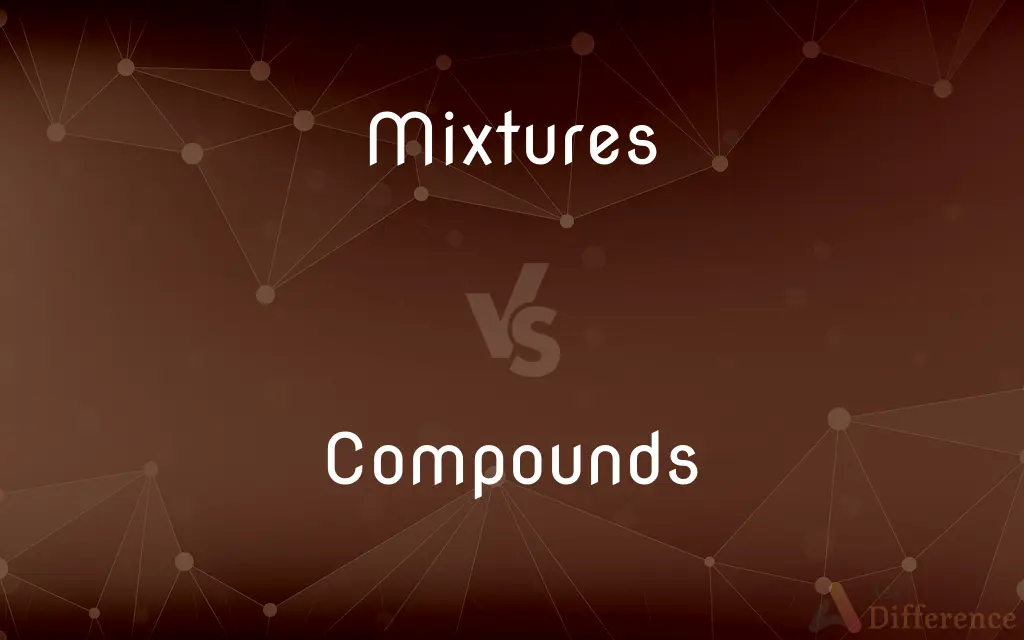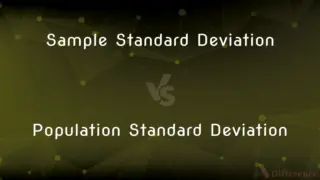Mixtures vs. Compounds — What's the Difference?
Edited by Tayyaba Rehman — By Fiza Rafique — Published on January 6, 2024
Mixtures combine substances without chemical bonding; compounds form when elements chemically bond in fixed ratios.

Difference Between Mixtures and Compounds
Table of Contents
ADVERTISEMENT
Key Differences
Mixtures and compounds both consist of two or more elements or compounds, but mixtures are formed by physical blending without chemical bonding. Each substance in a mixture retains its own chemical properties and can be separated by physical means. Compounds, however, result from a chemical reaction where elements bond in a fixed, definite ratio, and the resulting compound has properties different from its constituent elements.
In a mixture, components can be present in any proportion and can be homogeneous or heterogeneous, like salt mixed with pepper or air, which is a homogeneous mixture of gases. Compounds, such as water (H2O), always have a homogeneous composition with elements present in a fixed ratio and cannot be separated into their elements by physical means, but rather require chemical reactions.
The properties of a mixture reflect the individual properties of its components. For example, a mixture of iron filings and sulfur can exhibit both the magnetic properties of iron and the yellow color of sulfur. In a compound, properties are unique and distinct from the properties of the elements that constitute it; sodium chloride (table salt) is neither metallic like sodium nor poisonous like chlorine gas.
Mixtures can be made and unmade through physical processes without a change in energy states. Mixing oil and water creates a mixture that can be separated by decanting. Conversely, compounds require a chemical reaction involving a change in energy; forming water releases energy, and breaking water into hydrogen and oxygen requires energy input.
The formation of mixtures is typically reversible and non-reactive, such as mixing alcohol and water, which can be separated again by distillation. The formation and decomposition of compounds, like the rusting of iron (Fe2O3), involve reactions that are often irreversible and result in new chemical structures, which necessitates a change in the identity of the elements involved.
ADVERTISEMENT
Comparison Chart
Chemical Bonding
No chemical bonds between components
Chemical bonds between elements
Composition
Variable composition
Fixed composition
Separation
Can be separated physically
Can be separated chemically
Properties
Retains individual properties
Has new properties
Ratios of Components
Not in fixed ratio
In a fixed ratio
Compare with Definitions
Mixtures
Mixtures can be separated into their components through physical means.
A mixture of iron filings and sulfur can be separated with a magnet.
Compounds
Compounds are substances formed by the chemical combination of two or more elements.
Water (H2O) is a compound made from hydrogen and oxygen.
Mixtures
Mixtures are substances composed of two or more different components mixed together.
Sand and salt stirred together form a mixture.
Compounds
Compounds have a fixed, definite formula.
Carbon dioxide (CO2) always contains one carbon and two oxygen atoms.
Mixtures
The components of mixtures are not in a fixed proportion.
Coffee can be made as a mixture with varying amounts of sugar and cream.
Compounds
In compounds, the elements involved lose their individual properties.
Sodium chloride is a compound that is neither metallic like sodium nor gaseous like chlorine.
Mixtures
Mixtures can be heterogeneous or homogeneous in nature.
A smoothie is a homogeneous mixture of various fruits and liquids.
Compounds
The properties of compounds are different from those of their constituent elements.
Ammonia (NH3) is a compound with properties distinct from nitrogen and hydrogen.
Mixtures
In mixtures, the individual components retain their original properties.
A salad is a mixture where each ingredient maintains its unique taste and texture.
Compounds
To combine so as to form a whole; mix
Tin was often compounded with lead to make pewter.
Mixtures
The act or process of mixing
An alloy made from the mixture of two metals.
Compounds
To produce or create by combining two or more ingredients or parts; compose or make up
Pharmacists compounding prescriptions.
Mixtures
The condition of being mixed
The inevitable mixture of different cultures in big cities.
Compounds
To settle (a debt, for example) by agreeing on an amount less than the claim; adjust.
Mixtures
A combination of ingredients used in cooking or baking.
Compounds
To compute (interest) on the principal and accrued interest.
Mixtures
One that consists of diverse elements
The day was a mixture of sun and clouds.
Compounds
To add to or intensify so as to make worse
"The university authorities ... compounded their crime in dismissing [the professor] by denying that their action ... reflected any abridgment of academic freedom" (John Kenneth Galbraith).
Mixtures
A fabric made of different kinds of thread or yarn.
Compounds
To make worse by being an additional or intensifying factor
High winds compounded the difficulties of the firefighters.
Mixtures
(Chemistry) A composition of two or more substances that are not chemically combined with each other and are capable of being separated.
Compounds
To combine in or form a compound.
Mixtures
Plural of mixture
Compounds
To come to terms; agree.
Compounds
Consisting of two or more substances, ingredients, elements, or parts.
Compounds
(Botany) Composed of more than one part
A compound pistil.
Compounds
A combination of two or more elements or parts.
Compounds
(Linguistics) A word that consists either of two or more elements that are independent words, such as loudspeaker, self-portrait, or high school, or of specially modified combining forms of words, such as Greek philosophia, from philo-, "loving," and sophia, "wisdom."
Compounds
(Chemistry) A pure, macroscopically homogeneous substance consisting of atoms or ions of two or more different elements in definite proportions that cannot be separated by physical means. A compound usually has properties unlike those of its constituent elements.
Compounds
A building or buildings, especially a residence or group of residences, set off and enclosed by a barrier.
Compounds
An enclosed area used for confining prisoners of war.
Compounds
Plural of compound
Compounds
Infl of compound
Compounds
Compounds are created and decomposed through chemical reactions.
Photosynthesis produces glucose, a compound, from carbon dioxide and water.
Common Curiosities
What defines a compound?
A compound is a substance with two or more elements chemically combined in a fixed ratio.
Can mixtures be separated easily?
Yes, mixtures can usually be separated by physical methods like filtration or distillation.
Do mixtures have a fixed composition?
Mixtures do not have a fixed composition; their components can be combined in any ratio.
Are compounds considered pure substances?
Yes, compounds are pure substances because of their uniform and definite composition.
Can the properties of mixtures vary?
The properties of mixtures can vary depending on the ratio and identity of the mixed substances.
Is the formation of a compound a physical change?
The formation of a compound is a chemical change involving the making or breaking of bonds.
Are all compounds solid at room temperature?
No, compounds can be solids, liquids, or gases at room temperature.
Are the components of a compound easy to separate?
No, compounds require chemical reactions to be separated into their elements.
Can mixtures be both solid and liquid?
Yes, mixtures can exist in any state of matter, including solid, liquid, and gas.
What defines a mixture?
A mixture is defined by its physical combination of two or more substances that retain their own properties.
Do compounds exhibit the properties of their constituent elements?
No, compounds have new properties distinct from those of the elements that form them.
Do compounds have a variable composition?
Compounds have a fixed, definite composition and cannot vary in proportion.
Are mixtures considered pure substances?
Mixtures are not pure substances because they can consist of various proportions of components.
How do you identify a mixture versus a compound?
A mixture can be identified by its variable composition and the retention of properties of its components, whereas a compound has a fixed composition and distinct properties.
Is the creation of a mixture a chemical change?
The creation of a mixture is not a chemical change; it's a physical process.
Share Your Discovery

Previous Comparison
Sample Standard Deviation vs. Population Standard Deviation
Next Comparison
Social Service vs. Social WorkAuthor Spotlight
Written by
Fiza RafiqueFiza Rafique is a skilled content writer at AskDifference.com, where she meticulously refines and enhances written pieces. Drawing from her vast editorial expertise, Fiza ensures clarity, accuracy, and precision in every article. Passionate about language, she continually seeks to elevate the quality of content for readers worldwide.
Edited by
Tayyaba RehmanTayyaba Rehman is a distinguished writer, currently serving as a primary contributor to askdifference.com. As a researcher in semantics and etymology, Tayyaba's passion for the complexity of languages and their distinctions has found a perfect home on the platform. Tayyaba delves into the intricacies of language, distinguishing between commonly confused words and phrases, thereby providing clarity for readers worldwide.













































